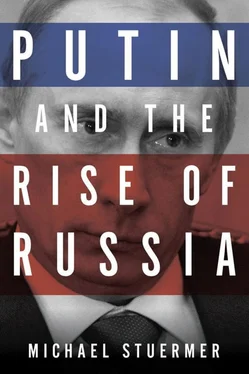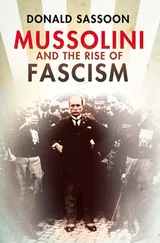The EU, behind all the detail, the compromises and the frustrations, seems to be developing something amounting to a grand strategy. For any foreseeable future, Europeans will need Russian energy. But the Russians, too, will have a growing interest in creating a level playing field with the high technology of Western industries. They understand that they have to diversify their economy away from sole reliance on energy and weaponry and create a post-oil technology base. This is where the Europeans come in. To quote, once again, from the DG RELEX briefing for the House Lords: ‘There are many prizes which can be obtained to our mutual benefit: much closer cooperation, innovation and high technology, outer space, aviation, biotechnology, nanotechnology, increased people-to-people contacts with visa freedom as a long-term perspective, substantial increase of tourism, tens of thousands studying in each others’ universities…. Our difficulty is that we agree on the need to get from A to Z but have great difficulties in getting from A to B to C.’
The EU on its own cannot handle the Russian dossier. It would need much more cooperation from the nation states who are going to profit from any future framework agreement. It would also benefit greatly once Russia meets the conditions for acceptance into the WTO with its code of conduct. Personal networking also has an important role to play, particularly the Association of European Business (AEB). AEB has a membership of 540 companies, all of them from the EU or EFTA (formerly the European Free Trade Association and now the European Economic Space) doing business in Russia, or with Russian partners. It was established in 1995 under the name of the European Business Club. Later, it was renamed and reorganized and is by now the framework organization for EU companies in Russia, parallel to national institutions with similar objectives, such as the British Business Club. It ranks just behind the American Chamber of Commerce in terms of membership numbers and activities. The AEB tries to operate like a think tank for both the EU in Brussels and the authorities in Moscow. This is considerably more than the usual lobbying, and covers fields like energy, banking, tax, copyright and patent law. It is not precisely grassroots work but brings a lot of fundamental issues to the fore.
Better believe in Adam Smith
In the long run, however, the logic of the market is the most important force in creating a common legal and economic space between Russia and the EU Europeans. You don’t have to be a Marxist and look at the material foundations of human behaviour. Follow Adam Smith and trust in the rules of enlightened egotism. Much as the rough and tumble of the early Industrial Revolution gave way to a more equitable system in Britain and Europe, and much as robber barons in the US eventually made their peace with the law and the rest of society, there is a good chance that the new ruling class of oligarchs and siloviki will sooner or later understand that to secure their ill-gotten gains they have to be part of a rule-based system. Moreover, Western companies wanting to do business with their Russian counterparts have to make sure that the more unappetizing elements of many of Russia’s big companies are being eradicated and that the rule of law prevails. They don’t want to be robbed, burn their hands or risk their reputation at home – under, for instance, the watchful eye of the Securities and Exchange Commission of the US. There is broad convergence.
Today Russia’s markets are underregulated and overregulated at the same time, burdened by corruption and red tape in any conceivable combination. After centuries of tsars and commissars, improvement will take time, but also pressure from outside. It is the civilizing influence of advanced global capitalism that can convert robber barons into regular guys, and responsible players who will force them, sooner or later, to conform to rules made in the global market place.
11
In search of a foreign policy
‘The Kremlin is not just a palace like any other, it is a complete city, and this city is the very heart of Moscow; it serves as the frontier of two parts of the world, the East and the West. The Old World and the Modern World are present there. Under the successors of Genghis Khan, Asia stamped on the earth and out of it came the Kremlin.’
Marquis de Custine,
Journey for Our Time
Russia, to modify what US Secretary of State Dean Acheson famously said about Great Britain, fifteen years after the Second World War, ‘has lost an empire and not yet found a role’.
In Russia the domestic foundations of a new global role, markedly different from the failed aspirations of the Soviet empire, are being redesigned. No longer Soviet power but the Russian federation is being praised, a halfway house between an overblown nation state and a continental empire, in uneasy cohabitation with a restive Muslim population. In economic terms, everything so far is based on oil wealth and the building of powerful, though in many respects inefficient state concerns comprising industries designated by the Kremlin as strategic. The outside world would be well advised to understand both the brutal power accumulated and the brittle nature of the power structure on top. There are some golden fortresses in Moscow, St Petersburg and elsewhere throughout the Russian federation, but beneath the proud towers the foundations are unstable.
Defining the international environment
The population base is probably the foremost long-term concern of Kremlin leaders, to be reconstructed and strengthened. The demographic challenge, for Russia more serious than for the rest of Europe, is seriously undermining recruitment in the army and other employment sectors, particularly natural sciences. It is also a threat to the homogeneity of the Russian federation. Rarely spoken of in public, it is an ever-present concern, the modern Russian equivalent of France’s ‘ Jamais en parler, toujours en penser ’, referring to Alsace-Lorraine: always think of it, never speak of it.
The Iron Curtain provided a symmetry of friend and foe, without many grey zones in between. This is, after the disillusionment of the 1990s, still a point of departure in public discourse, East versus West, with Russia pretty much alone, and Putin at Munich must have been aware that, while raising eyebrows in the world at large, he was winning at home. By contrast, democracy in Russia is associated with weakness and intrusions by the West into the Russian sphere of influence. Domestic support and foreign policy orientation correspond.
Today one out of two Russians believes that during Soviet times the international situation was more favourable to Russia, stable and reliable – the misery of Afghanistan being conveniently forgotten. Only one in twenty Russians would name the time of Yeltsin as being good for Russia’s international standing. To produce a sense of direction, it helps to have a foreign enemy. When, however, Putin refers to the enemy, people are given to understand that it is, without always being specifically named, the United States of America that dropped the first atom bomb in anger, poisoned Vietnam and is, above all, envious of the rise and glory of the motherland.
Europe by contrast is liked, to some extent admired and certainly not feared. Four out of five Russians admit to positive emotions about Europe and Europeanness. This should not, however, be taken as a final farewell to Russia’s Asian vocation. One out of two Russians asserts that Russia was never of Europe or in Europe, and should therefore do everything to cultivate Russian traditions and Russian values. In terms of global players, Europe and the various European countries are not big enough to be deemed worthy of the enemy image: what power can an assemblage of twenty-seven states wield? What sovereignty can be exercised by a Commission that is the servant of twenty-seven masters big and small ?
Читать дальше











